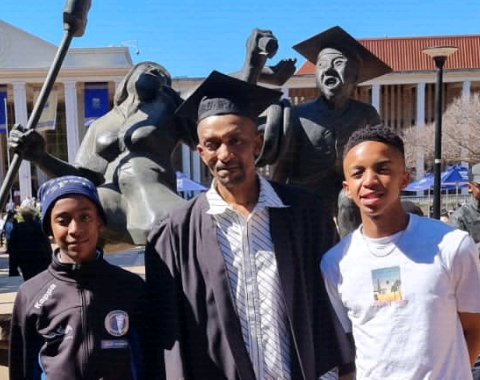
Food security in middle-income countries is a growing concern that was brought into sharper focus during the COVID-19 pandemic and recent global events, which saw the cost of fuel and food rising considerably. Yet, research conducted by the University of the Western Cape’s (UWC) S’celo Ezra Madondo indicates that food wastage is a prevalent phenomenon in middle- and low-income communities.
Madondo graduated with a master’s degree in September 2022, thanks, in part, to funding he received from the DSI-NRF Centre of Excellence in Food Security (CoE-FS), which is hosted by UWC and co-hosted by the University of Pretoria. It is the first DSI-NRF centre of excellence to be hosted at a historically black university.
“The food category with the highest levels of wastage in low and middle-income communities is vegetables,” said Madondo of his findings.
He conducted an analysis of household food wastage in Kraaifontein, a community located in Cape Town’s northern suburbs. Madondo’s engagement with research participants highlighted that people perceive the cost of vegetables to be relatively cheaper than other food items like meat, canned goods, and dairy products.
It also highlights how, over time, food waste becomes expensive, and leads to a waste of resources that could potentially have been used elsewhere. For example, the water used to grow crops could have been used for other on-farm activities. A secondary implication of large-scale food waste is its contribution to global warming.
“Food waste goes to landfills and it emits methane gas which, over time, contributes to climate change,” said the UWC graduate.
Challenges and rewards
Madondo’s graduation ceremony was the culmination of a challenging yet equally rewarding journey for the Soweto native. As the first of a family of 10 to pass matric in 1989, Madondo initially enrolled for a long-distance degree programme at UNISA in 1990, but soon realised that distance learning was not for him.
Still, determined to gain a higher education qualification — and with persuasion from his brother who, at the time, lived and was studying in Cape Town — Madondo enrolled for a National Higher Diploma in Education (Commerce) from the Cape Peninsula University of Technology in 1992, and graduated in 1995.
Between 1996 and 2017, Madondo worked in the public and private sectors across South Africa and through his engagement with one of his professional networks, the Rural Development Network, he was motivated to enrol for the honours programme in Development Studies at UWC in 2018.
A year later, Madondo registered for a structured coursework master’s in Development Studies at the Institute for Social Development (ISD) under the mentorship of study leader and CoE-FS centre manager, Dr Elaine Sinden.
“I am thankful for the funding from the CoE-FS; it was a welcome and much-appreciated financial relief for a mature graduate with a family of my own to support,” he said.
Rooted in ubuntu
Madondo’s interest in his research topic is rooted in his passion for working with people, as well as his ethical views of ubuntu.
“When an individual becomes aware of and educated on a problem, they can start influencing their immediate networks which creates the potential for wider impact. The more we talk about food wastage as neighbours and communities, [the more] we start impacting the global agenda.”
Reflecting on the road to graduation, Madondo said that some of the most rewarding moments of his master’s research were during the data collection phase when his interactions with research participants evoked a deeper understanding of their food wastage and a commitment to change current food handling practices.
“As a teacher by profession, one of the greatest achievements is when you see that ‘light bulb’ moment go on in your learners’ minds as a result of your work, and this is what I saw in my interactions with the research participants. That is when you know you have made a difference,” he said.
As both data collection rounds coincided with the pandemic, he also took time to explain the dangers of COVID-19 and bought and distributed masks to many of his study participants’ households as well as their neighbours between interviews and the focus group discussion sessions.
Obtaining his master’s degree during the pandemic required grit and determination. In addition to his proposal submission being delayed due to an administrative error, the data Madondo had collected in 2020 could not be used in his thesis due to universities implementing a hold on the collection of research data during the pandemic and hard lockdown. As a result, Madondo had to conduct a second round of data collection in 2021 for inclusion in his thesis.
“I am very grateful to all those individuals who contributed to my growth and success.”
Outside of his academics, Madondo is also involved in community work in the Zevenwacht, Blackheath and Stellenbosch areas, particularly with sports and youth development. He also works with NPOs that focus on small business development and assisting small-scale farmers.
He says that there is still much to learn about food security and food wastage, and he plans to probe further. Now, Madondo is actively seeking opportunities for PhD funding in the development studies and business spheres so that he can achieve his goal of completing a doctorate.
related Articles
Dr Degracious Kgoale’s mission to improve food safety in informal markets
Dr Degracious Kgoale is the first in her family to hold a doctorate. Photo EYEscape/CoE-FS. Degracious Moloko Kgoale, who recently…
Food, power, and inequality: Vision for a fairer food system
Oscar Sithole is a PhD candidate at the University of Pretoria, and a grantee of the CoE-FS. Photo EYEscape/CoE-FS. Oscar…
Dr Mondli Masanabo’s path of passion, perseverance, and purpose
Dr Mondli Masanabo graduated with a PhD in Food Science from CoE-FS co-host, the University of Pretoria. Photo EYEscape/CoE-FS. When…



